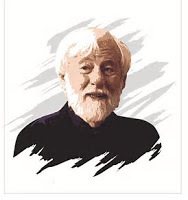Anthony McIntyre's Blog, page 1146
May 9, 2018
A Morning Thought (18)
Published on May 09, 2018 00:30
May 8, 2018
The Great Day
The Uri Avnery Column reflects on David Ben Gurion's declaration of the state of Israel.
Everyone agreed: It was a historic moment, when David Ben-Gurion got up in a small hall in Tel Aviv and declared the foundation of the state.
Everybody still alive from then was asked this week: Where were you at that moment? What did you feel, when history knocked on the door?
Well, I was alive. And I did not feel anything.
I was a soldier in the new army, which was not yet called "Israeli Defense Army " (its official name in Hebrew). My company had a small encampment of pup tents in Hulda, a kibbutz south of Tel Aviv.
We were to attack an Arab village called al-Kubab, near the town of Ramleh, that night. Stiff resistance was expected, and we were making all kinds of preparations, as soldiers do before a battle, when somebody ran up and shouted: "Quick, Ben-Gurion is declaring the state in the dining hall!" In the dining hall of the kibbutz was the only radio in the vicinity. Everyone ran there, including me.
Frankly, I did not give a damn about the declaration. We were in the middle of a desperate war – desperate for both sides – and we knew that the fighting would decide whether our state would come about or not. If we won the war, there would be a state. If we lost he war, there would be no state and no we.
A speech by a politician somewhere in Tel Aviv would make no difference whatsoever.
But I was curious about one detail: what would the new state be called? There had been several suggestions, and I wanted to know which one was accepted.
When I heard the word "Israel", I left the dining room and returned to cleaning my rifle.
The fierce battle, by the way, did not materialize. When we attacked the village from two sides, the inhabitants fled. We entered empty houses, with the food still warm on the tables. The inhabitants were never allowed to return.
The next morning my company was transferred to the south. The Egyptian army was entering Palestine, and we were to stop them before they reached Tel Aviv. But that is another story.
David Ben Gurion, whose voice I had heard that afternoon on the radio, has by now become the national hero of all times, the man who created the State of Israel. This week a documentary about him was broadcast on television.
The director, Raviv Drucker, an excellent journalist, has produced a very good film. It shows Ben-Gurion as he really was, with all his good and bad points.
Compared to him, his successors in the Prime Minister's office were second rate. Not to mention the present occupant, who is a dwarf.
It was Ben-Gurion who took the decision to declare the foundation of the state at that particular moment, when the last British occupier had left and four neighboring Arab armies were about to enter the country. His colleagues were afraid of the decision and had to be pushed by him.
Frankly, I don't think that this decision was so momentous. If the declaration had been deferred for some months, it would have made no real difference. After we had won the war, though with very heavy casualties, we could have declared the state at any time.
While the documentary is mostly accurate, there are some mistakes. For example, it shows the masses of Tel Avivis cheering in the streets upon the declaration. That is a falsification, though it has been repeated so often that Drucker can be excused for believing it. In fact, the masses cheered in November 1947, when the United Nations decided upon the partition of Palestine into an Arab state and a Jewish state (and a separate unit in Jerusalem).
When the Jewish state was officially founded on May 14, and Ben-Gurion made that speech, the streets were empty. The young were in the army, their elders were too anxious to cheer.
In that war, some 6300 of us were killed – out of a total Jewish population of 630,000. The equivalent of three million US citizens today. Many more were wounded (including poor me). Losses on the Arab side were even higher in absolute terms.
Ben Gurion's Affectations were many and colorful. He liked to present himself as a great philosopher, and the documentary shows him receiving many hundreds of books, paid for by a rich British Jew - which would be a criminal offense under current Israeli law.
Be-Ge (as we called him) interfered in the conduct of the war, some of his erroneous decisions cost many lives. He also changed the character of the army in ways that we soldiers resented very much.
But all his good and bad decisions were negligible compared to his real historic role: his decision to turn Israel into a bulwark against the rising Arab world.
Of course, the Zionist movement was from the beginning a conscious part of European colonialism. In his book, "Der Judenstaat", the founder, Theodor Herzl, already promised that the state would be "a part of the wall of European civilization against Asiatic barbarism".
But it was Ben-Gurion who turned this vague promise into fact from the first day of Israel. According to his first biographer, he detested the Arabs and Arab culture from his first day in Palestine, suppressed the Arab minority in Israel and refused to draw Israel's borders.
The underlying reason was and is of course, that Zionism from the beginning wanted to dispossess the Arabs from their land in order to create there a new Jewish nation. This was never admitted, but was clear from the beginning.
All Ben-Gurion's successors, up to the present occupant of the office, followed this line. Even on its 70th birthday, Israel recognizes no official borders. Though we have official peace agreements with two Arab states (Egypt and Jordan) and unofficial cooperation with several more, we are hated by hundreds of millions of Arabs and a billion Muslims. And, even more important: we are at war with the entire Palestinian people. That is the real legacy of Ben-Gurion.
I Am not quite objective on this subject. I, too, was at war with Ben-Gurion.
The longer his reign lasted, the more autocratic he became. Altogether, from his assumption of power in the pre-state Zionist movement, he was the supreme leader for 30 consecutive years. No human being can be in power for so long without becoming a bit deranged.
I became the owner and editor-in-chief of a news magazine soon after the war, and began to criticize him sharply: his increasingly dictatorial manner, his colonialist treatment of the Palestinians, his anti-peace policy, his reactionary socio-economic policy and the corruption of many of his followers.
The chief of the security service publicly called me "Government Enemy No.1". On one occasion the security chief (nicknamed "Little Issar") suggested to Ben-Gurion to put me under "administrative detention" – arrest without a court order. Ben-Gurion agreed, but under one condition: that the leader of the opposition, Menachem Begin, would silently agree. Begin refused adamantly and threatened to kick up a stink. He also warned me in secret.
My office was bombed several times, I myself was attacked and my hands broken. (As I have said before, that attack was a blessing in disguise. A young woman named Rachel volunteered to move in with me to help me along for a few weeks, and stayed for 53 years, until her death.)
At the height of our fight, Ben-Gurion ordered the National Theater (Habima) to produce a piece openly directed against me. It showed the vicious editor of a weekly paper, who enjoyed making people miserable. Though he never usually went to the theater, he attended this premiere. The documentary shows him, his wife and colleagues applauding wildly. The piece did not survive three performances.
It Must be admitted that he was a very courageous leader. Though a staunch anti-Communist, he let Stalin support Israel with arms during the 1948 War of Independence. He made peace with Germany just eight years after the Holocaust, because the young state desperately needed money. He entered into the famous collusion with France and Britain to attack Egypt (with disastrous results.)
Towards the end, he surrounded himself with young disciples – Moshe Dayan, Teddy Kollek, Shimon Peres and others, and his elderly colleagues became afraid of him. They ganged up on him and threw him out. His efforts to form a new party and stage a comeback ran into the sand. In the end we made a kind of peace.
When we look back today upon his entire career, it must be admitted that his influence on today's Israel is immense. For better and for worse, he laid the tracks on which Israel is still rolling.
Mostly for the worse.
 Uri Avnery is a veteran Israeli peace activist.
Uri Avnery is a veteran Israeli peace activist.
He writes @ Gush Shalom


Everyone agreed: It was a historic moment, when David Ben-Gurion got up in a small hall in Tel Aviv and declared the foundation of the state.
Everybody still alive from then was asked this week: Where were you at that moment? What did you feel, when history knocked on the door?
Well, I was alive. And I did not feel anything.
I was a soldier in the new army, which was not yet called "Israeli Defense Army " (its official name in Hebrew). My company had a small encampment of pup tents in Hulda, a kibbutz south of Tel Aviv.
We were to attack an Arab village called al-Kubab, near the town of Ramleh, that night. Stiff resistance was expected, and we were making all kinds of preparations, as soldiers do before a battle, when somebody ran up and shouted: "Quick, Ben-Gurion is declaring the state in the dining hall!" In the dining hall of the kibbutz was the only radio in the vicinity. Everyone ran there, including me.
Frankly, I did not give a damn about the declaration. We were in the middle of a desperate war – desperate for both sides – and we knew that the fighting would decide whether our state would come about or not. If we won the war, there would be a state. If we lost he war, there would be no state and no we.
A speech by a politician somewhere in Tel Aviv would make no difference whatsoever.
But I was curious about one detail: what would the new state be called? There had been several suggestions, and I wanted to know which one was accepted.
When I heard the word "Israel", I left the dining room and returned to cleaning my rifle.
The fierce battle, by the way, did not materialize. When we attacked the village from two sides, the inhabitants fled. We entered empty houses, with the food still warm on the tables. The inhabitants were never allowed to return.
The next morning my company was transferred to the south. The Egyptian army was entering Palestine, and we were to stop them before they reached Tel Aviv. But that is another story.
David Ben Gurion, whose voice I had heard that afternoon on the radio, has by now become the national hero of all times, the man who created the State of Israel. This week a documentary about him was broadcast on television.
The director, Raviv Drucker, an excellent journalist, has produced a very good film. It shows Ben-Gurion as he really was, with all his good and bad points.
Compared to him, his successors in the Prime Minister's office were second rate. Not to mention the present occupant, who is a dwarf.
It was Ben-Gurion who took the decision to declare the foundation of the state at that particular moment, when the last British occupier had left and four neighboring Arab armies were about to enter the country. His colleagues were afraid of the decision and had to be pushed by him.
Frankly, I don't think that this decision was so momentous. If the declaration had been deferred for some months, it would have made no real difference. After we had won the war, though with very heavy casualties, we could have declared the state at any time.
While the documentary is mostly accurate, there are some mistakes. For example, it shows the masses of Tel Avivis cheering in the streets upon the declaration. That is a falsification, though it has been repeated so often that Drucker can be excused for believing it. In fact, the masses cheered in November 1947, when the United Nations decided upon the partition of Palestine into an Arab state and a Jewish state (and a separate unit in Jerusalem).
When the Jewish state was officially founded on May 14, and Ben-Gurion made that speech, the streets were empty. The young were in the army, their elders were too anxious to cheer.
In that war, some 6300 of us were killed – out of a total Jewish population of 630,000. The equivalent of three million US citizens today. Many more were wounded (including poor me). Losses on the Arab side were even higher in absolute terms.
Ben Gurion's Affectations were many and colorful. He liked to present himself as a great philosopher, and the documentary shows him receiving many hundreds of books, paid for by a rich British Jew - which would be a criminal offense under current Israeli law.
Be-Ge (as we called him) interfered in the conduct of the war, some of his erroneous decisions cost many lives. He also changed the character of the army in ways that we soldiers resented very much.
But all his good and bad decisions were negligible compared to his real historic role: his decision to turn Israel into a bulwark against the rising Arab world.
Of course, the Zionist movement was from the beginning a conscious part of European colonialism. In his book, "Der Judenstaat", the founder, Theodor Herzl, already promised that the state would be "a part of the wall of European civilization against Asiatic barbarism".
But it was Ben-Gurion who turned this vague promise into fact from the first day of Israel. According to his first biographer, he detested the Arabs and Arab culture from his first day in Palestine, suppressed the Arab minority in Israel and refused to draw Israel's borders.
The underlying reason was and is of course, that Zionism from the beginning wanted to dispossess the Arabs from their land in order to create there a new Jewish nation. This was never admitted, but was clear from the beginning.
All Ben-Gurion's successors, up to the present occupant of the office, followed this line. Even on its 70th birthday, Israel recognizes no official borders. Though we have official peace agreements with two Arab states (Egypt and Jordan) and unofficial cooperation with several more, we are hated by hundreds of millions of Arabs and a billion Muslims. And, even more important: we are at war with the entire Palestinian people. That is the real legacy of Ben-Gurion.
I Am not quite objective on this subject. I, too, was at war with Ben-Gurion.
The longer his reign lasted, the more autocratic he became. Altogether, from his assumption of power in the pre-state Zionist movement, he was the supreme leader for 30 consecutive years. No human being can be in power for so long without becoming a bit deranged.
I became the owner and editor-in-chief of a news magazine soon after the war, and began to criticize him sharply: his increasingly dictatorial manner, his colonialist treatment of the Palestinians, his anti-peace policy, his reactionary socio-economic policy and the corruption of many of his followers.
The chief of the security service publicly called me "Government Enemy No.1". On one occasion the security chief (nicknamed "Little Issar") suggested to Ben-Gurion to put me under "administrative detention" – arrest without a court order. Ben-Gurion agreed, but under one condition: that the leader of the opposition, Menachem Begin, would silently agree. Begin refused adamantly and threatened to kick up a stink. He also warned me in secret.
My office was bombed several times, I myself was attacked and my hands broken. (As I have said before, that attack was a blessing in disguise. A young woman named Rachel volunteered to move in with me to help me along for a few weeks, and stayed for 53 years, until her death.)
At the height of our fight, Ben-Gurion ordered the National Theater (Habima) to produce a piece openly directed against me. It showed the vicious editor of a weekly paper, who enjoyed making people miserable. Though he never usually went to the theater, he attended this premiere. The documentary shows him, his wife and colleagues applauding wildly. The piece did not survive three performances.
It Must be admitted that he was a very courageous leader. Though a staunch anti-Communist, he let Stalin support Israel with arms during the 1948 War of Independence. He made peace with Germany just eight years after the Holocaust, because the young state desperately needed money. He entered into the famous collusion with France and Britain to attack Egypt (with disastrous results.)
Towards the end, he surrounded himself with young disciples – Moshe Dayan, Teddy Kollek, Shimon Peres and others, and his elderly colleagues became afraid of him. They ganged up on him and threw him out. His efforts to form a new party and stage a comeback ran into the sand. In the end we made a kind of peace.
When we look back today upon his entire career, it must be admitted that his influence on today's Israel is immense. For better and for worse, he laid the tracks on which Israel is still rolling.
Mostly for the worse.
 Uri Avnery is a veteran Israeli peace activist.
Uri Avnery is a veteran Israeli peace activist.
He writes @ Gush Shalom


Published on May 08, 2018 11:30
Sinn Féin Must Now Oppose Repeal Of 8th Amendment
Matt Treacy thinks Sinn Fein has it wrong on the 8th Amendment.

The one consistent thread throughout the Committee hearings and subsequent debate in Leinster House on the referendum to introduce abortion, was the extraordinary cross party consensus among supporters of repeal. From the right of Fine Gael to the far left of the various Trotskyist configurations, and all points between, there was an insistence that the wording be confined simply to the proposal to remove the 8th amendment.
Once the electorate agreed to repeal simpliciter then the majority in favour of abortion in the Oireachtas could then legislate to introduce the 12 weeks limit and other provisions which they do not want to become the focus of attention. And without the irritant of having to place all of that before the citizenry.
That seemed to be going to plan until Simon Harris, on legal advice from the Attorney General but perhaps also sensing the opportunity to lead the liberal charge, persuaded the Cabinet on the need to include specific criteria. The Attorney General advised the Government at the end of January that a simple repeal of the 8th would lead to possible legal challenges, and that the wording needed to include the provision for the Oireachtas to legislate if the referendum proposal passes. That was accepted. It seems that Harris was also persuaded to go beyond that and to include a reference to a 12 weeks gestational period as being part of the legislation to be introduced if the repeal side wins.
That is exactly what most of most of the abortion camp did not want. The Committee and Dáil debates and votes would indicate that there is support for a liberal interpretation of the option of legislate, which was going to be exercised anyway, but they would have preferred that any debate on the terms be postponed until after the referendum when the electorate will not have a direct say on the legislation. The placing of the 12 weeks limit will mean that people will be voting on that, and not on some vague proposal wrapped up in appeals to fairness and other factors that have nothing to do with the reality of what is being proposed.
Sinn Féin was already in a double quandary as although the majority of its TDs and senators were in favour of 12 weeks, that is not yet party policy, and must await an Ard Fheis to be held after the referendum. That will become a total irrelevance if there is reference to 12 weeks in the proposal. It surely now means that Sinn Féin will have to campaign for a No vote. Otherwise, party members advocating repeal are going against party policy.
Jonathan O’Brien was insistent that there be no references to any gestational period on the basis that Sinn Féin needed to avoid at all costs such an embarrassing scenario as has now transpired. He made the somewhat bizarre statement that:
So, despite the fact that it will indeed be O’Brien and his fellow members of the Dáil and Seanad who will have to legislate on the terms under which abortion will be made available, he seemed content that they be told what to do by the “medical profession and the women of the country,” as if they are some sort of homogenous group. Would he also be agreeable to the Budget being framed by the “banking profession” and property speculators?
It also implies that Sinn Féin and others would prefer that the electorate gave them carte blanche by just voting to repeal the 8th, and that they could then get on with framing liberal abortion laws that had not been voted on by the electorate. Which is a very strange conception of democracy and republicanism.
Slightly panicked by all of this, and having folded like other “pro life” TDs on 12 weeks, Táinaiste Simon Coveney proposed that any legislation on abortion, subsequent to introducing it up to 12 weeks, would require a two-thirds majority. That was ruled out by the Cabiner. It smacked of desperation on the part of Coveney who thought that he could run with the hare and hunt with the fox. He really must think people are a bit dim if he thinks that such a proposal would restore his credibility with the anti abortion side after he has capitulated on allowing abortion up to 12 weeks.
The more liberal elements, including Sinn Féin, loudly objected because they will indeed use a Yes vote and the provision for abortion up to 12 weeks to further push back the limits and criteria until all the politically correct boxes have been ticked. Sinn Féin and the far left already indicated the direction in which this will proceed by voting unsuccessfully at Committee to include “socio economic” reasons to be tied to health as a valid justification for abortion.
The “socio economic” clause separate from health was put by independent Senator Lynn Ruane who claimed that there is “loads of socio-economic stuff that can come up after the 12th week of pregnancy.” The closest she came to explaining what this would mean is that it would include members of a “minority group” or being “disadvantaged.” One wonders if she realises how close that is to the position of the early 20th century eugenicists on the extreme left and right who believed in the “stuff” about social health being improved by culling “minority groups” and the “disadvantaged,” and the disabled.
Meanwhile, given how insistent they are on adherence to the “party line,” Sinn Féin are surely bound to campaign for a No vote if there is any reference to a 12 weeks gestation period in what will be put to the electorate.
 Matt Treacy’s book
A Tunnel to the Moon: The End of the Irish
Republican Army
is also available @ Amazon.
Matt Treacy’s book
A Tunnel to the Moon: The End of the Irish
Republican Army
is also available @ Amazon.
Matt Treacy blogs @ Brocaire Books.
Follow Matt Treacy on Twitter @MattTreacy2



The one consistent thread throughout the Committee hearings and subsequent debate in Leinster House on the referendum to introduce abortion, was the extraordinary cross party consensus among supporters of repeal. From the right of Fine Gael to the far left of the various Trotskyist configurations, and all points between, there was an insistence that the wording be confined simply to the proposal to remove the 8th amendment.
Once the electorate agreed to repeal simpliciter then the majority in favour of abortion in the Oireachtas could then legislate to introduce the 12 weeks limit and other provisions which they do not want to become the focus of attention. And without the irritant of having to place all of that before the citizenry.
That seemed to be going to plan until Simon Harris, on legal advice from the Attorney General but perhaps also sensing the opportunity to lead the liberal charge, persuaded the Cabinet on the need to include specific criteria. The Attorney General advised the Government at the end of January that a simple repeal of the 8th would lead to possible legal challenges, and that the wording needed to include the provision for the Oireachtas to legislate if the referendum proposal passes. That was accepted. It seems that Harris was also persuaded to go beyond that and to include a reference to a 12 weeks gestational period as being part of the legislation to be introduced if the repeal side wins.
That is exactly what most of most of the abortion camp did not want. The Committee and Dáil debates and votes would indicate that there is support for a liberal interpretation of the option of legislate, which was going to be exercised anyway, but they would have preferred that any debate on the terms be postponed until after the referendum when the electorate will not have a direct say on the legislation. The placing of the 12 weeks limit will mean that people will be voting on that, and not on some vague proposal wrapped up in appeals to fairness and other factors that have nothing to do with the reality of what is being proposed.
Sinn Féin was already in a double quandary as although the majority of its TDs and senators were in favour of 12 weeks, that is not yet party policy, and must await an Ard Fheis to be held after the referendum. That will become a total irrelevance if there is reference to 12 weeks in the proposal. It surely now means that Sinn Féin will have to campaign for a No vote. Otherwise, party members advocating repeal are going against party policy.
Jonathan O’Brien was insistent that there be no references to any gestational period on the basis that Sinn Féin needed to avoid at all costs such an embarrassing scenario as has now transpired. He made the somewhat bizarre statement that:
There is an onus on politicians to recognise that we do not have the expertise to adjudicate on what gestational time frames if any should be put in place; that should be a matter for the medical profession and the women of the country.
So, despite the fact that it will indeed be O’Brien and his fellow members of the Dáil and Seanad who will have to legislate on the terms under which abortion will be made available, he seemed content that they be told what to do by the “medical profession and the women of the country,” as if they are some sort of homogenous group. Would he also be agreeable to the Budget being framed by the “banking profession” and property speculators?
It also implies that Sinn Féin and others would prefer that the electorate gave them carte blanche by just voting to repeal the 8th, and that they could then get on with framing liberal abortion laws that had not been voted on by the electorate. Which is a very strange conception of democracy and republicanism.
Slightly panicked by all of this, and having folded like other “pro life” TDs on 12 weeks, Táinaiste Simon Coveney proposed that any legislation on abortion, subsequent to introducing it up to 12 weeks, would require a two-thirds majority. That was ruled out by the Cabiner. It smacked of desperation on the part of Coveney who thought that he could run with the hare and hunt with the fox. He really must think people are a bit dim if he thinks that such a proposal would restore his credibility with the anti abortion side after he has capitulated on allowing abortion up to 12 weeks.
The more liberal elements, including Sinn Féin, loudly objected because they will indeed use a Yes vote and the provision for abortion up to 12 weeks to further push back the limits and criteria until all the politically correct boxes have been ticked. Sinn Féin and the far left already indicated the direction in which this will proceed by voting unsuccessfully at Committee to include “socio economic” reasons to be tied to health as a valid justification for abortion.
The “socio economic” clause separate from health was put by independent Senator Lynn Ruane who claimed that there is “loads of socio-economic stuff that can come up after the 12th week of pregnancy.” The closest she came to explaining what this would mean is that it would include members of a “minority group” or being “disadvantaged.” One wonders if she realises how close that is to the position of the early 20th century eugenicists on the extreme left and right who believed in the “stuff” about social health being improved by culling “minority groups” and the “disadvantaged,” and the disabled.
Meanwhile, given how insistent they are on adherence to the “party line,” Sinn Féin are surely bound to campaign for a No vote if there is any reference to a 12 weeks gestation period in what will be put to the electorate.
 Matt Treacy’s book
A Tunnel to the Moon: The End of the Irish
Republican Army
is also available @ Amazon.
Matt Treacy’s book
A Tunnel to the Moon: The End of the Irish
Republican Army
is also available @ Amazon. Matt Treacy blogs @ Brocaire Books.
Follow Matt Treacy on Twitter @MattTreacy2


Published on May 08, 2018 01:00
A Morning Thought (17)
Published on May 08, 2018 00:30
May 7, 2018
Triumphalist SAS Flags Erected At Loughgall.
A press release from Mairead & Roisin Kelly 0n behalf of The Loughgall Truth & Justice Campaign.
The families of the men are calling for the immediate removal of these flags as they are offensive, disrespectful and a mark of triumphalism. Someone needs to be held accountable for this action and charged with hate crime.
This is a sustained campaign against the families of the nine men killed at Loughgall. No one should glorify or mock the deaths of anyone regardless of who that person was or what that person was doing at the time of their death. This causes stress and unnecessary grief to families who are already grieving the death of their loved ones.


The families of the men are calling for the immediate removal of these flags as they are offensive, disrespectful and a mark of triumphalism. Someone needs to be held accountable for this action and charged with hate crime.
This is a sustained campaign against the families of the nine men killed at Loughgall. No one should glorify or mock the deaths of anyone regardless of who that person was or what that person was doing at the time of their death. This causes stress and unnecessary grief to families who are already grieving the death of their loved ones.


Published on May 07, 2018 10:46
Revolutionary Unionism - The Only Workable Solution
The introduction of an all-island military National Service is at the economic heart of Revolutionary Unionism. In this latest Fearless Flying Column today, controversial commentator Dr John Coulter outlines how his ideology will create thousands of jobs in a post Brexit Ireland.
The ethos of Revolutionary Unionism is about practically ‘Putting People First’. We’ve just had the local government elections in England along with the West Tyrone Westminster by-election. Candidates of whatever shade and persuasion talk a lot about wanting to put people first.
While this makes great manifesto and slogan reading as well as terrific soundbites, will the practice of ‘Putting People First’ work in reality? Revolutionary Unionism can give that guarantee to the people of Ireland post Brexit.
No matter what type of border – hard or soft – exists between the republic and Northern Ireland after next March, one fact of life will be indisputable – the people of Ireland will have to work together if the island is not to descend to the economic status of a third-rate banana state.
Revolutionary Unionism can live up to its pledge of guaranteeing work for all citizens. To become a recognised citizen, all adults once they reach the age of 16 will have to serve a minimum of two years in the Armed Force of either the UK in Northern Ireland, or the Irish Defence Forces in the republic.
During this two-year compulsory period of paid National Service, each person will learn a vocational trade. All branches of the forces will be open for National Service – the army, navy, air force and even the police.
For example, in the north, a young person could join the British Army at 16 immediately after completing their GCSEs. During their paid time in the Army, they could also learn a vocational trade which would be of use to them once their National Service is completed.
If that person came from the nationalist community and did not feel they could cope with serving in the British forces, they could still complete their National Service in the Irish Defence Forces. There would be extra cash bonuses for people who completed their National Service whilst serving abroad with either the United Nations or NATO.
National Service, while it could begin at 16, would be available at various stages in the educational calendar – at 18, for example, after A levels, or upon graduation from university. The two key factors are – to become a fully-fledged citizen of the new Ireland, you must do your minimum of two years’ paid National Service and learn your trade.
Of course, the key question, how would Revolutionary Unionism pay for and administer all-island National Service? Primarily, there would be a massive reduction in the overseas aid budgets of both the UK and the Irish republic. Millions of pounds and euros are wasted every year as the cash goes directly into the pockets of dictators, bureaucrats and administrators instead of the people who supposedly need it.
Revolutionary Unionism is unashamedly an ‘Ireland First’ ideology – we look after our own people before we pander to anyone else. Money which the UK will save by not having to pump millions into the European Union post Brexit can be used to develop the defence capabilities of the new Ireland.
Naturally, the republic would be persuaded of the benefits of Irexit and following the UK out of the EU as there is the real danger that the Irish republic would be forced to become a ‘giver’ to the EU rather than a ‘receiver’ to fill the huge financial black hole which will be created when the UK quits and EU and there is no cash flow to Europe from Westminster.
There has been much chat about the role of the British Irish Intergovernmental Conference in a post Brexit Ireland. While the Conference is merely a glorified talking shop at present, it could have a positive role in the administration of this all-island National Service with a joint armed forces defence policy between Northern Ireland and the South.
Leinster House and Westminster could have a joint role in the running of National Service. In the event of a terrorist threat, the British Army and Irish Defence Forces would have an agreed ‘hot pursuit’ policy across the whole island.
There would be no hopping across the border to escape as happened during the conflict where republican terrorists had only a short distance to run to the diplomatic safety of the Irish republic.
Likewise, Revolutionary Unionism would generate income from other global powers through nuclear waste recycling and storage. Four nuclear waste recycling plants would be located in each of the island’s four provinces employing citizens from the island.
Added to this would be a service to refit nuclear submarines, ships or aircraft from the nuclear powers. As an island, Ireland has numerous ports and airports where such naval and air force servicing could be maintained. All money made from this servicing would be re-invested into the island’s economy, not just for the paid National Service programme, but also to boost the island’s health and education service sectors.
A more controversial scheme of income generation would be the creation of a Camp X-ray in each of Ireland’s four provinces to house terrorist suspects from across the globe. Just as the Americans operated such a camp at Guantanamo Bay for many years to hold terror suspects, the same scheme would be in place in Ireland. Nations would pay Ireland through the British Irish Intergovernmental Conference to keep their terror suspects.
Taking Guantanamo Bay as a benchmark and noting the huge amount of infrastructure needed to maintain these camps, it is estimated each provincial camp would create and maintain 25,000 jobs – that’s 100,000 new security-related jobs for a post Brexit Ireland.
Critics and opponents of Revolutionary Unionism can dismiss these practical policies as simply ‘bat crazy’, but at least Revolutionary Unionism is looking at workable ways of creating income for the island, north and south, once the economic reality of Brexit comes home to roost.
At the heart of Revolutionary Unionism is the need for Unionist to start thinking – and believing – in an all-island future. For nationalists, it is the need to recognise that with Brexit, the republic can no longer survive on its own; it will need to negotiate a new Anglo-Irish Treaty leading to a closer, more formal Union with the UK and the Commonwealth Parliamentary Association.
One mistake not to make – do not confuse Revolutionary Unionism’s all-island ethos with liberal Unionism’s pathetic pleas that Unionists should face the inevitable United Ireland. There is a major difference between the positive, pro-active realism of Revolutionary Unionism, and the politics of surrender and capitulation of liberal Unionism’s United Ireland compromising.
As the countdown to Brexit continues, in the coming weeks and months, I will be outlining how Revolutionary Unionism as an ideology can take the people of Ireland forward. When I first mooted my Revolutionary Unionist ideology as a radical postgraduate politics student at Queen’s University in the early 1990s, the idea of all-island thinking in Unionism was a total joke.
Those within my own Unionist community who dismissed Revolutionary Unionism as a non-starter clearly did not reckon that the euro-skeptic camp would ever win the argument.
Like it or loathe it, Brexit will be a reality and if Unionism is to survive as a realistic ideology on this island, the Revolutionary Unionist path is the only workable solution.
 Dr John Coulter has been a journalist working in Ireland for the past 40 years.
Dr John Coulter has been a journalist working in Ireland for the past 40 years.
His ebook, An Sais Glas (The Green Sash) The Road to National Republicanism is published on Amazon Kindle.
Dr Coulter is on Twitter @JohnAHCoulter


The ethos of Revolutionary Unionism is about practically ‘Putting People First’. We’ve just had the local government elections in England along with the West Tyrone Westminster by-election. Candidates of whatever shade and persuasion talk a lot about wanting to put people first.
While this makes great manifesto and slogan reading as well as terrific soundbites, will the practice of ‘Putting People First’ work in reality? Revolutionary Unionism can give that guarantee to the people of Ireland post Brexit.
No matter what type of border – hard or soft – exists between the republic and Northern Ireland after next March, one fact of life will be indisputable – the people of Ireland will have to work together if the island is not to descend to the economic status of a third-rate banana state.
Revolutionary Unionism can live up to its pledge of guaranteeing work for all citizens. To become a recognised citizen, all adults once they reach the age of 16 will have to serve a minimum of two years in the Armed Force of either the UK in Northern Ireland, or the Irish Defence Forces in the republic.
During this two-year compulsory period of paid National Service, each person will learn a vocational trade. All branches of the forces will be open for National Service – the army, navy, air force and even the police.
For example, in the north, a young person could join the British Army at 16 immediately after completing their GCSEs. During their paid time in the Army, they could also learn a vocational trade which would be of use to them once their National Service is completed.
If that person came from the nationalist community and did not feel they could cope with serving in the British forces, they could still complete their National Service in the Irish Defence Forces. There would be extra cash bonuses for people who completed their National Service whilst serving abroad with either the United Nations or NATO.
National Service, while it could begin at 16, would be available at various stages in the educational calendar – at 18, for example, after A levels, or upon graduation from university. The two key factors are – to become a fully-fledged citizen of the new Ireland, you must do your minimum of two years’ paid National Service and learn your trade.
Of course, the key question, how would Revolutionary Unionism pay for and administer all-island National Service? Primarily, there would be a massive reduction in the overseas aid budgets of both the UK and the Irish republic. Millions of pounds and euros are wasted every year as the cash goes directly into the pockets of dictators, bureaucrats and administrators instead of the people who supposedly need it.
Revolutionary Unionism is unashamedly an ‘Ireland First’ ideology – we look after our own people before we pander to anyone else. Money which the UK will save by not having to pump millions into the European Union post Brexit can be used to develop the defence capabilities of the new Ireland.
Naturally, the republic would be persuaded of the benefits of Irexit and following the UK out of the EU as there is the real danger that the Irish republic would be forced to become a ‘giver’ to the EU rather than a ‘receiver’ to fill the huge financial black hole which will be created when the UK quits and EU and there is no cash flow to Europe from Westminster.
There has been much chat about the role of the British Irish Intergovernmental Conference in a post Brexit Ireland. While the Conference is merely a glorified talking shop at present, it could have a positive role in the administration of this all-island National Service with a joint armed forces defence policy between Northern Ireland and the South.
Leinster House and Westminster could have a joint role in the running of National Service. In the event of a terrorist threat, the British Army and Irish Defence Forces would have an agreed ‘hot pursuit’ policy across the whole island.
There would be no hopping across the border to escape as happened during the conflict where republican terrorists had only a short distance to run to the diplomatic safety of the Irish republic.
Likewise, Revolutionary Unionism would generate income from other global powers through nuclear waste recycling and storage. Four nuclear waste recycling plants would be located in each of the island’s four provinces employing citizens from the island.
Added to this would be a service to refit nuclear submarines, ships or aircraft from the nuclear powers. As an island, Ireland has numerous ports and airports where such naval and air force servicing could be maintained. All money made from this servicing would be re-invested into the island’s economy, not just for the paid National Service programme, but also to boost the island’s health and education service sectors.
A more controversial scheme of income generation would be the creation of a Camp X-ray in each of Ireland’s four provinces to house terrorist suspects from across the globe. Just as the Americans operated such a camp at Guantanamo Bay for many years to hold terror suspects, the same scheme would be in place in Ireland. Nations would pay Ireland through the British Irish Intergovernmental Conference to keep their terror suspects.
Taking Guantanamo Bay as a benchmark and noting the huge amount of infrastructure needed to maintain these camps, it is estimated each provincial camp would create and maintain 25,000 jobs – that’s 100,000 new security-related jobs for a post Brexit Ireland.
Critics and opponents of Revolutionary Unionism can dismiss these practical policies as simply ‘bat crazy’, but at least Revolutionary Unionism is looking at workable ways of creating income for the island, north and south, once the economic reality of Brexit comes home to roost.
At the heart of Revolutionary Unionism is the need for Unionist to start thinking – and believing – in an all-island future. For nationalists, it is the need to recognise that with Brexit, the republic can no longer survive on its own; it will need to negotiate a new Anglo-Irish Treaty leading to a closer, more formal Union with the UK and the Commonwealth Parliamentary Association.
One mistake not to make – do not confuse Revolutionary Unionism’s all-island ethos with liberal Unionism’s pathetic pleas that Unionists should face the inevitable United Ireland. There is a major difference between the positive, pro-active realism of Revolutionary Unionism, and the politics of surrender and capitulation of liberal Unionism’s United Ireland compromising.
As the countdown to Brexit continues, in the coming weeks and months, I will be outlining how Revolutionary Unionism as an ideology can take the people of Ireland forward. When I first mooted my Revolutionary Unionist ideology as a radical postgraduate politics student at Queen’s University in the early 1990s, the idea of all-island thinking in Unionism was a total joke.
Those within my own Unionist community who dismissed Revolutionary Unionism as a non-starter clearly did not reckon that the euro-skeptic camp would ever win the argument.
Like it or loathe it, Brexit will be a reality and if Unionism is to survive as a realistic ideology on this island, the Revolutionary Unionist path is the only workable solution.
 Dr John Coulter has been a journalist working in Ireland for the past 40 years.
Dr John Coulter has been a journalist working in Ireland for the past 40 years. His ebook, An Sais Glas (The Green Sash) The Road to National Republicanism is published on Amazon Kindle.
Dr Coulter is on Twitter @JohnAHCoulter


Published on May 07, 2018 01:00
A Morning Thought (16)
Published on May 07, 2018 00:30
May 6, 2018
Anthony Connor Vindicated
Thomas Lynch welcomes the not guilty verdict in the case of Drogheda political activist, Anthony Connor.
We always knew the charges were trumped up charges which brought a barring order against Anthony from entering any estates where meters were been installed.
This was the sole purpose in our view to why the charges were brought as Anthony was totally opposed to such installations where as the government are trying to tax the people for water they already pay for.
Anthony was one of the very few who stood with us in Duleek preventing water meters been installed especially when we were physically attacked in Stoneyford Green by Coffey Northumberian workers while Gardai looked on.
Thomas Lynch is a moving force behind the Duleek 1916-1981 Monument Committee


We always knew the charges were trumped up charges which brought a barring order against Anthony from entering any estates where meters were been installed.
This was the sole purpose in our view to why the charges were brought as Anthony was totally opposed to such installations where as the government are trying to tax the people for water they already pay for.
Anthony was one of the very few who stood with us in Duleek preventing water meters been installed especially when we were physically attacked in Stoneyford Green by Coffey Northumberian workers while Gardai looked on.
Thomas Lynch is a moving force behind the Duleek 1916-1981 Monument Committee


Published on May 06, 2018 11:31
Pope’s Document - Satan Mentioned More Than A Dozen Times
As if having an imaginary god is not enough, the pope now resurrects the mythical devil. Lena M writes for Atheist Republic.
 Photo Credits: Love These PicsShortly after Italian journalist and atheist Eugenio Scalfari claimed that Pope Francis had told him hell is not real, Pope Francis released a document in which he mentions Satan more than a dozen times. This way Pope Francis tried to put Satan in its place and assure everyone that he absolutely believes in hell and hell's leader.
Photo Credits: Love These PicsShortly after Italian journalist and atheist Eugenio Scalfari claimed that Pope Francis had told him hell is not real, Pope Francis released a document in which he mentions Satan more than a dozen times. This way Pope Francis tried to put Satan in its place and assure everyone that he absolutely believes in hell and hell's leader.
Eugenio Scalfari, a 93 years old journalist and atheist, who made an intellectual friendship with the pontiff, claimed in his article that Pope told him that "“A Hell doesn’t exist”, and provoked an answer from Vatican officials. In a document, so-called Apostolic Exhortation titled Gaudete et Exsultate (Rejoice and Be Glad), Pope is citing the devil repeatedly and also talking about his ongoing fight against Satan, who is supposed to be real.
As Reuters reports, Satan gets more than a dozen mentions in the document as Francis talks about how life can be “a constant struggle against the devil, the prince of evil”. He continues in the same section:
Francis refers to the “wiles of the devil”, “the spirit of the devil”, “keeping the devil at bay”, how to “banish the devil”, and “snares and temptations of the devil”.
According to the document, Satan is not an imaginary character made up in order to be an evil counterpart to another imaginary character and we should fight him by all means. This may sound more like a fairytale; aren’t there bigger problems we should address and fight other than trying to "keep the devil at bay?” In the 21st century, is it productive for society to believe Satan should be overcome? Or, should Satan remain in science fiction movies or books despite what the Vatican claims?
Moreover, this Pope's document and the Vatican's insistence that Satan is not an imaginary character have some concrete effects which can be reflected in real life. One of the effects of the Vatican’s belief in the Prince of Darkness’ terrifying powers is the fact that Father Cesar Truqui, a professional demon-fighter, is scheduled to teach a course in exorcism in Rome this month, according to Patheos. Demand for exorcism is on the rise, Truqui says, as more bishops around the world, who were once skeptical about the practice, have come to see it as a possible solution to their parishioners’ problems.
 About Atheist Republic
About Atheist Republic
Follow Atheist Republic on Twitter @AtheistRepublic


 Photo Credits: Love These PicsShortly after Italian journalist and atheist Eugenio Scalfari claimed that Pope Francis had told him hell is not real, Pope Francis released a document in which he mentions Satan more than a dozen times. This way Pope Francis tried to put Satan in its place and assure everyone that he absolutely believes in hell and hell's leader.
Photo Credits: Love These PicsShortly after Italian journalist and atheist Eugenio Scalfari claimed that Pope Francis had told him hell is not real, Pope Francis released a document in which he mentions Satan more than a dozen times. This way Pope Francis tried to put Satan in its place and assure everyone that he absolutely believes in hell and hell's leader. Eugenio Scalfari, a 93 years old journalist and atheist, who made an intellectual friendship with the pontiff, claimed in his article that Pope told him that "“A Hell doesn’t exist”, and provoked an answer from Vatican officials. In a document, so-called Apostolic Exhortation titled Gaudete et Exsultate (Rejoice and Be Glad), Pope is citing the devil repeatedly and also talking about his ongoing fight against Satan, who is supposed to be real.
As Reuters reports, Satan gets more than a dozen mentions in the document as Francis talks about how life can be “a constant struggle against the devil, the prince of evil”. He continues in the same section:
Hence, we should not think of the devil as a myth, a representation, a symbol, a figure of speech or an idea. This mistake would lead us to let down our guard, to grow careless and end up more vulnerable.
Francis refers to the “wiles of the devil”, “the spirit of the devil”, “keeping the devil at bay”, how to “banish the devil”, and “snares and temptations of the devil”.
According to the document, Satan is not an imaginary character made up in order to be an evil counterpart to another imaginary character and we should fight him by all means. This may sound more like a fairytale; aren’t there bigger problems we should address and fight other than trying to "keep the devil at bay?” In the 21st century, is it productive for society to believe Satan should be overcome? Or, should Satan remain in science fiction movies or books despite what the Vatican claims?
Moreover, this Pope's document and the Vatican's insistence that Satan is not an imaginary character have some concrete effects which can be reflected in real life. One of the effects of the Vatican’s belief in the Prince of Darkness’ terrifying powers is the fact that Father Cesar Truqui, a professional demon-fighter, is scheduled to teach a course in exorcism in Rome this month, according to Patheos. Demand for exorcism is on the rise, Truqui says, as more bishops around the world, who were once skeptical about the practice, have come to see it as a possible solution to their parishioners’ problems.
 About Atheist Republic
About Atheist RepublicFollow Atheist Republic on Twitter @AtheistRepublic


Published on May 06, 2018 01:00
A Morning Thought (15)
Published on May 06, 2018 00:30
Anthony McIntyre's Blog
- Anthony McIntyre's profile
- 2 followers
Anthony McIntyre isn't a Goodreads Author
(yet),
but they
do have a blog,
so here are some recent posts imported from
their feed.











